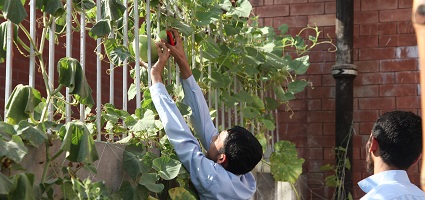FAO’s vegetable and fruit garden for food security in rural, peri-urban and urban settings

Sharing the joys and happiness of office backyard garden
“I am amazed to see vegetables grown in a bag,” said 15 year-old Asad Ullah, student of the Anjumun Faiz ul Islam’ Madrassa in Rawalpindi, about a homestead garden FAO grows on its premises in Islamabad. “I will take the bag I have received from FAO to my home in Muzaffarabad so my siblings can grow vegetables in it,” added the youth.
Asad was one of ten madrassa students who came to visit FAO office in Islamabad on a hot summer afternoon. Together with their religious studies teacher, Mr. Mohammad Shuaib, the students met FAO Representative in Pakistan Mr. Patrick T. Evans, learned about FAO activities in the country, and joined FAO team in harvesting the vegetables grown in FAO homestead garden. “We are very pleased to share our garden with students,” noted Patrick T. Evans, FAO Representative in Pakistan. “We hope that these youths will return again and again to enjoy the harvest of other vegetables and fruits, as well as to learn how to grow a similar garden at their school.”
FAO helps to introduce homestead gardens throughout Pakistan as a means to increased food security in some of the poorest communities of the country. Research shows that homestead gardens can provide up to half of all the vegetables and a significant portion of nutrients a family needs. Typically, homestead gardens require little purchased inputs and can be easily managed by household members.
As the young visitors learned during their visit, homestead gardens can be grown in even smallest unused spaces of land, on the roofs, and even in various containers, such as was done by the FAO Office in Islamabad. Using sturdy bags, FAO team has grown tomatoes, cucumbers, gourds, okra, strawberries, and a variety of other vegetables in a small space outside the office.
FAO used the June 4 visit as an opportunity to share the produce grown with the madrassa students. Each student picked at least 1.5 kilograms of vegetables from FAO garden – the total harvest is enough to provide a nutritious meal for about 200 children. FAO team also presented the students with a bag of tomatoes, bitter gourds, and other vegetables harvested earlier in the week. But perhaps the most important gift that the students received was the knowledge about a new way to supplement household food rations. “Today, we have learned how different ideas can be adopted and to set up a fruit and vegetable garden,” said their teacher, Mr. Shuaib.
“If these vegetables can be grown at FAO office, we can also grow them at our school,” said another student, 16-ear old Kamran, about the experience.
